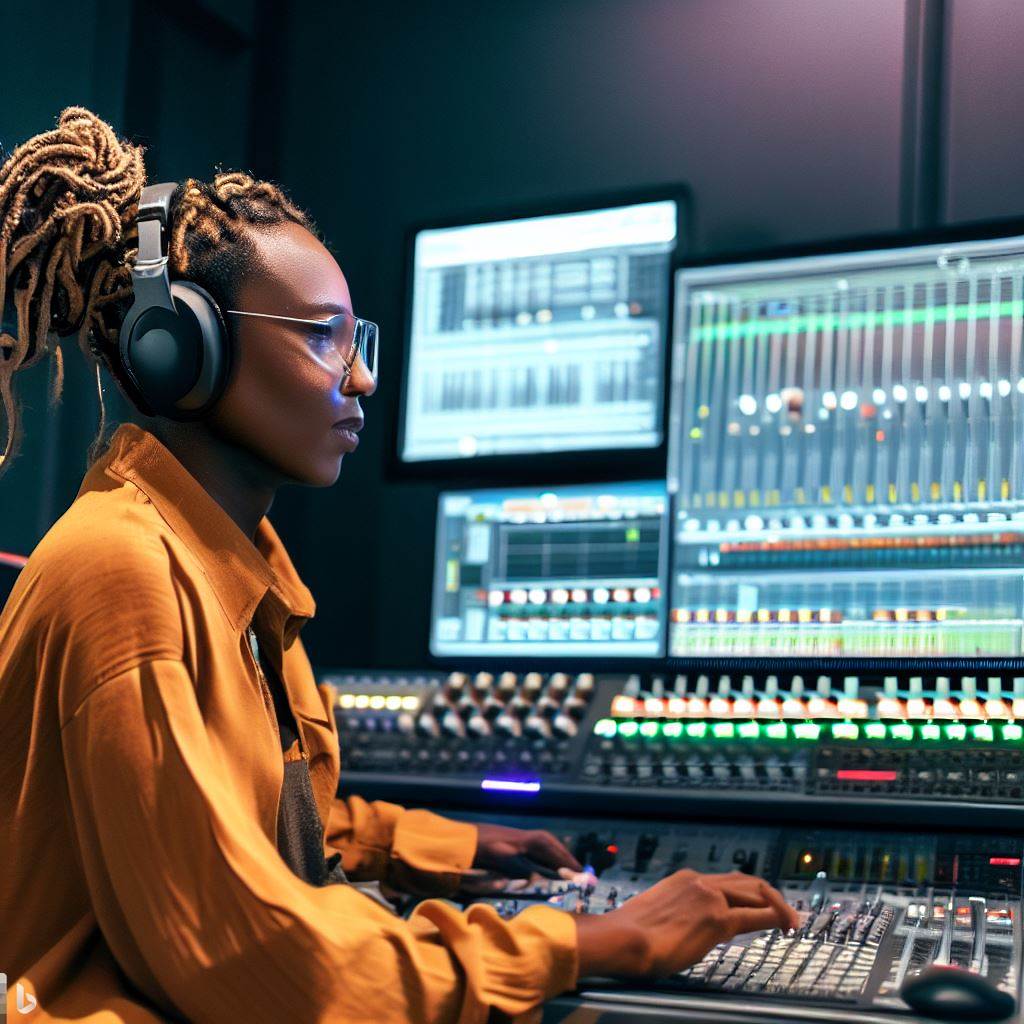Introduction
Royalties are payments made to artists for the use of their music. Royalties are crucial in the music industry as they provide income for songwriters, composers, and performers.
The Nigerian music industry has experienced significant growth and has become globally recognized.
Decoding Royalties: What Every Artist Should Know
Royalties are payments artists receive when their music is used, ensuring fair compensation for their creative efforts.
Empowering the Music Ecosystem with Royalties
- Financial Fuel: Royalties provide artists with income streams, fostering sustainable careers and creativity.
- Recognition Rewarded: Compensation for usage encourages artists to continue producing exceptional music.
- Innovation Ignited: Fair royalties support innovation by enabling artists to invest in new projects and experiments.
Navigating Nigeria’s Lyrical Landscape
- Afrobeats Resonance: Nigeria’s music scene, especially Afrobeats, has gained global acclaim, driving immense industry growth.
- Vibrant Diversity: A fusion of indigenous rhythms and modern influences fuels a dynamic range of musical genres.
- Digital Disruption: The digital era has transformed music consumption, presenting both opportunities and challenges for royalties.
- Collecting Societies: Organizations like COSON collect and distribute royalties, safeguarding artists’ financial interests.
- Piracy Predicament: Piracy remains a challenge, affecting royalty earnings and artist livelihoods.
Diving into the Royalty Rhythm
In Nigeria’s music realm, royalties play a vital role, sustaining artists and harmonizing the symphony of creativity.
Understanding Royalties
When it comes to music publishing, royalties refer to the payments made to songwriters, composers, and publishers for the use of their musical compositions.
Types of royalties
- Mechanical Royalties: These are royalties paid to songwriters and/or publishers for the reproduction and distribution of their compositions.
- Performance Royalties: These royalties are earned when a composition is publicly performed, whether live or through broadcasting, streaming, or other means.
- Sync Royalties: Sync royalties are paid when a composition is synchronized with visual media, such as in movies, TV shows, commercials, or video games.
How royalties are derived and calculated
Royalties are derived from various income sources generated by the exploitation of musical compositions.
The calculation of royalties depends on different factors, such as the type of royalty and the relevant agreements.
For mechanical royalties, the rate is usually based on a percentage of the wholesale price or the revenue from the sale or reproduction of the compositions.
The rate can vary depending on the country or region, as well as the terms negotiated between the parties involved.
Performance royalties are typically collected through performing rights organizations (PROs), which track and monitor the public performance of compositions.
PROs collect fees from venues, broadcasters, streaming platforms, and other sources, and distribute the royalties to the appropriate songwriters, composers, and publishers.
Sync royalties are negotiated on a case-by-case basis and can vary widely depending on factors such as the prominence of the composition, the duration of the synchronization, and the budget of the production using the composition.
These royalties are often split between the songwriter and the publisher.
In the end, royalties in the context of music publishing are the payments made to songwriters, composers, and publishers for the use of their musical compositions.
They can be derived from mechanical rights, performance rights, or synchronization rights, and their calculation depends on various factors and agreements.
Read: Decoding the Music Publishing Landscape in Nigeria
The Role of Music Publishers in Nigeria
The role of music publishers in managing and protecting songwriters’ rights
- Music publishers in Nigeria play a crucial role in managing and protecting the rights of songwriters.
- They act as intermediaries between songwriters and the music industry, ensuring that songwriters receive fair compensation for their work.
- Music publishers help songwriters monetize their music by licensing it for various uses, such as recordings, performances, and broadcasts.
- They negotiate and administer agreements with record labels, distributors, broadcasters, and digital platforms on behalf of songwriters.
- Music publishers also handle the legal aspects related to copyright registration and enforcement, protecting songwriters from infringement.
- They actively seek opportunities for songwriters to collaborate with other artists, producers, and advertisers, expanding their network and exposure.
- Additionally, music publishers provide guidance and mentoring to emerging songwriters, helping them develop their skills and navigate the industry.
Responsibilities of music publishers in Nigeria
- Music publishers in Nigeria have several responsibilities to fulfill in order to effectively manage and protect songwriters’ rights.
- They must actively promote and market the songs of their songwriter clients to attract a wider audience and generate income.
- Music publishers need to stay updated on the latest trends and market demands to maximize the commercial potential of their songwriter’s music.
- They are responsible for negotiating favorable licensing deals with music users to ensure songwriters receive fair royalty rates.
- Music publishers must regularly collect and distribute royalties to songwriters based on the usage of their songs.
- They are also responsible for monitoring and tracking the usage of songs to ensure that proper royalties are being paid.
- Music publishers should provide transparent accounting to songwriters, reporting all income and expenses related to their songs accurately.
Significance of music publishers in ensuring fair royalty distribution
- Music publishers play a significant role in ensuring fair royalty distribution among songwriters in Nigeria.
- They help in the collection and management of royalties from various sources, ensuring that songwriters receive their rightful earnings.
- Music publishers have the resources and expertise to track and monitor the usage of songs across different platforms, maximizing revenue opportunities.
- By actively licensing songs and negotiating deals, music publishers can increase the exposure and reach of songwriters’ music, leading to higher royalty earnings.
- They provide a platform for songwriters to focus on their creative work while handling the business aspects of music monetization.
- Music publishers also act as advocates for songwriters, fighting for their rights and ensuring that they are not exploited by music users.
- Furthermore, music publishers contribute to the growth of the Nigerian music industry by fostering a sustainable environment for songwriters to thrive.
In fact, music publishers in Nigeria play a crucial role in managing and protecting the rights of songwriters. They handle various responsibilities, including licensing, marketing, royalty collection, and distribution.
Music publishers are instrumental in ensuring fair royalty distribution and maximizing the commercial potential of songs.
Their significance in the industry cannot be overlooked, as they contribute to the growth and sustainability of the Nigerian music ecosystem.
Read: Work Opportunities for Translators and Interpreters in Nigeria
Challenges Faced by Music Publishers in Nigeria
A successful music industry relies heavily on a robust royalty collection system, which unfortunately is lacking in Nigeria.
Music publishers in the country face several challenges that hinder their ability to effectively collect royalties. This section will explore three major challenges faced by music publishers in Nigeria.
Lack of royalty collection infrastructure
One of the primary challenges faced by music publishers in Nigeria is the lack of a well-developed royalty collection infrastructure.
The absence of a centralized organization or agency responsible for collecting and distributing royalties makes it difficult for publishers to track and receive their rightful earnings.
Unlike countries with established collecting societies, Nigeria lacks a reliable mechanism for royalty collection.
The absence of a proper infrastructure creates an environment where publishers have limited control over their revenue streams, leading to significant revenue loss.
Publishers face challenges in efficiently monitoring and collecting royalties from streaming, radio, and TV platforms.
Piracy and copyright infringement issues
Piracy and copyright infringement pose significant challenges for music publishers in Nigeria.
The lack of strong enforcement and penalties for intellectual property theft allows piracy to flourish, leading to substantial financial losses for publishers and artists alike.
Illegally reproduced copies of music are widely available, both in physical and digital formats.
Pirates take advantage of the lack of copyright protection to freely distribute copyrighted music without obtaining the necessary licenses.
This not only affects the bottom line of publishers but also undermines the value of intellectual property in the Nigerian music industry.
The prevalence of piracy discourages publishers from investing in new music and hampers the growth of the industry as a whole.
Limited awareness and education on royalties among artists
While educating artists on the importance of royalties is crucial, limited awareness poses a significant challenge for music publishers in Nigeria.
Many artists remain uninformed about the concept of royalties and how they can benefit from them.
This lack of understanding creates difficulties in collecting and distributing funds, as artists may not actively pursue their entitled earnings.
Public awareness campaigns and educational initiatives are necessary to bridge this knowledge gap.
Artists need to be educated on the various revenue streams available to them, such as performance royalties, mechanical royalties, and synchronization royalties.
By empowering artists with the necessary information, publishers can ensure a more efficient and fair royalty collection process.
The challenges faced by music publishers in Nigeria are not insurmountable.
However, addressing the lack of royalty collection infrastructure, combating piracy, and increasing awareness and education among artists are crucial steps towards a thriving music industry in the country.
Implementing these measures will not only benefit publishers but also create a conducive environment for creativity and growth within the Nigerian music ecosystem.
Read: Exploring Income Potential: The Pay for Translator in Nigeria

Royalty Distribution Processes in Nigeria
Collective management organizations (CMOs) in Nigeria
- The Copyright Society of Nigeria (COSON)
- The Performing Musicians Employers’ Association of Nigeria (PMAN)
- The Nigerian Music Rights Organization (NMRO)
Role of CMOs in collecting and distributing royalties
- CMOs are responsible for collecting royalties from various sources such as radio stations, television networks, and live performances.
- They ensure that music creators receive fair compensation for the use of their intellectual property.
- CMOs distribute royalties to their registered members based on the usage and popularity of their music.
- They also negotiate licensing agreements with users of music to generate revenue for their members.
Challenges faced by CMOs and ongoing efforts to improve the system
- One major challenge is the issue of transparency and accountability in royalty collection and distribution.
- There have been cases of mismanagement and misappropriation of funds by some CMOs.
- The lack of a centralized database of music works and creators also poses a challenge to accurate royalty distribution.
- To address these challenges, the Nigerian Copyright Commission (NCC) and the Nigerian music industry stakeholders are collaborating to establish a collective management system.
- The proposed system aims to ensure transparency, accountability, and efficient royalty distribution processes.
- The NCC is also working on the implementation of a digital system that will register works and track usage for accurate royalty distribution.
- Efforts are being made to enforce compliance and hold CMOs accountable for their actions.
- Training and capacity-building programs are being organized for CMOs to improve their governance and operational practices.
- Collaboration between CMOs and international organizations such as the International Confederation of Societies of Authors and Composers (CISAC) is being fostered to learn from best practices.
- Creating awareness among music creators about their rights and the importance of registering with CMOs is another ongoing effort.
Read: How to Start a Music Publishing Career in Nigeria
The Impact of Technology on Royalties in Nigeria
Advancements in music streaming services and digital sales platforms
- Streaming services like Spotify, Apple Music, and YouTube have revolutionized the music industry.
- These platforms have provided a convenient and accessible way for users to listen to music.
- They have also expanded the reach of Nigerian artists, allowing their music to be heard worldwide.
- Digital sales platforms such as iTunes and Amazon Music have made purchasing music easier than ever before.
- Artists can now release their songs and albums directly to these platforms, eliminating the need for physical distribution.
- This has significantly reduced the barriers to entry for musicians, especially in Nigeria where physical distribution is challenging.
- Advancements in technology have also made it possible for artists to independently distribute their music without traditional record labels.
- This has given artists more control over their royalties and the ability to negotiate better deals.
- Overall, advancements in music streaming services and digital sales platforms have greatly benefitted Nigerian artists.
The shift from physical sales to streaming and its effect on royalty payments
- In the past, physical sales, such as CDs and vinyl records, were the primary source of revenue for artists.
- However, with the rise of streaming, there has been a significant shift in how music is consumed.
- This shift has had a profound impact on royalty payments in Nigeria.
- While streaming has made music more accessible, it has also led to a decline in royalty rates.
- The streaming model typically pays artists a fraction of a cent per stream, resulting in lower overall royalty payments.
- This decline has affected not only established artists but also emerging talents who rely on royalties.
- Additionally, piracy remains a significant issue in Nigeria, further reducing artists’ royalty earnings.
- Despite these challenges, streaming platforms have become an essential part of the music industry, and artists need to adapt.
The importance of transparent and accurate technology solutions for royalty tracking and reporting
- As technology continues to shape the music industry, it is crucial to have transparent and accurate royalty tracking and reporting systems.
- These systems ensure that artists receive fair compensation for their work and protect their rights.
- With the complex nature of streaming platforms, it is essential to have technology solutions that can track and report accurate royalty payments.
- This requires cooperation between music publishers, streaming platforms, and collecting societies in Nigeria.
- Transparent technology solutions can also help combat piracy and ensure that artists’ royalties are not lost to illegal downloads.
- A robust and reliable royalty tracking and reporting system will instill confidence in artists and encourage the growth of the music industry in Nigeria.
- It is crucial for stakeholders in the industry to invest in these technologies and prioritize transparency and accuracy.
- Ultimately, technology solutions for royalty tracking and reporting will play a significant role in ensuring a fair and sustainable music ecosystem in Nigeria.
Gain More Insights: Software Tools Every Nigerian Animation Director Needs
Success Stories of Music Publishers in Nigeria
Music publishers who have made significant contributions to royalty management
- Yivera Music Publishing Company: This company has revolutionized royalty management in Nigeria through innovative strategies.
- Ultra Sound Music Publishers: Known for their efficient collection and distribution system, they have set a benchmark for other publishers.
Successful royalty collection and distribution in Nigeria
Case Study 1: Yivera Music Publishers
- Implemented a transparent royalty tracking system, resulting in increased payouts to artists.
- Collaborated with digital platforms, enabling accurate tracking and efficient collection of royalties.
- Established strong relationships with performing rights organizations, ensuring timely distribution of royalties.
Case Study 2: Ultra Sound Music Publishers
- Introduced a user-friendly artist portal, allowing artists to track their royalties real-time.
- Conducted regular audits to identify any discrepancies and rectify them promptly.
- Utilized technology to streamline the collection and distribution process, reducing errors and delays.
Benefits and lessons learned from these success stories
- Increased Artist Income: Successful royalty management leads to higher payouts, enabling artists to earn a sustainable income.
- Transparency: Implementing transparent systems builds trust between publishers, artists, and stakeholders.
- Tech Integration: Leveraging technology improves efficiency, accuracy, and ease of royalty collection and distribution.
- Collaboration with Stakeholders: Building strong relationships with performing rights organizations and digital platforms ensures streamlined processes.
- Regular Audits: Conducting periodic audits ensures that royalties are accurately calculated and fairly distributed.
- Empowering Artists: Providing artists with real-time access to royalty information empowers them to make informed decisions.
Basically, music publishers such as Yivera Music Publishing Company and Ultra Sound Music Publishers have successfully transformed royalty management in Nigeria.
Through their innovative strategies, transparent systems, and effective collaborations, they have not only benefited artists but also elevated the music industry as a whole.
Implementing lessons learned from these success stories can enhance royalty management practices, leading to a thriving music ecosystem in Nigeria.
Find Out More: Top Artists’ and Performers’ Managers in Nigeria Today
Conclusion
Summary of the importance of royalties for music publishers in Nigeria
Music publishers in Nigeria play a crucial role in ensuring that artists receive the royalties they deserve for their creative works.
By securing these royalties, publishers enable artists to thrive financially and continue producing quality music.
Call to action for artists and stakeholders to prioritize understanding and protecting their rights.
It is imperative for artists and stakeholders in the Nigerian music industry to educate themselves about royalties and the rights associated with them.
By doing so, they can advocate for fair treatment and ensure that their intellectual property is properly protected.
The future outlook for royalties in Nigeria.
The future of royalties in Nigeria looks promising, thanks to recent advancements in technology and increased recognition of intellectual property rights.
As the industry continues to grow and evolve, it is expected that more artists and stakeholders will benefit from a fair and transparent royalty system.




